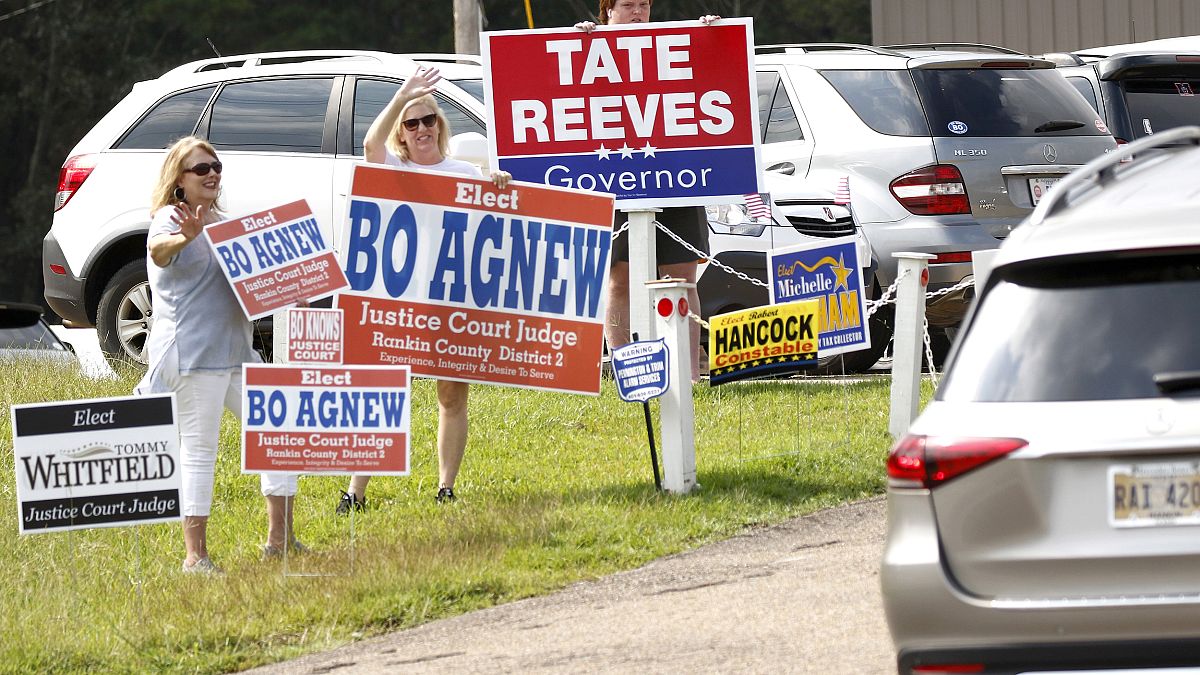A viral cellphone video of a defective voting machine raised doubts about a Republican primary on Tuesday, sparking broader concerns about U.S. elections.
A viral cellphone video of a defective voting machine cast some doubt on a contentious Mississippi Republican gubernatorial primary Tuesday, sparking broader concerns about U.S. voting infrastructure ahead of 2020.
In the video, voter Ethan Peterson of Oxford, Mississippi, attempted numerous times to press the touchscreen checkbox for Republican Bill Waller Jr., but the machine instead registered his GOP primary rival Tate Reeves. Eventually he was able to fix the issue and vote as intended, Peterson said.
It was one of two instances from Tuesday, confirmed by the Mississippi secretary of state, in which older touchscreen machines indicated votes for the wrong candidate.
Accounts commenting on the viral post questioned the integrity of the U.S. election system. But Peterson said he thought it was simply a calibration issue.
"My intent is not to feed the conspiracy monster," Peterson, a 43-year-old fire protection coordinator at the University of Mississippi, told NBC News.
"Make sure your vote is correct before you hit go, because if I wasn't paying attention, I would have voted for the guy I didn't want to," he said.
During the 2016 presidential election, Russian state-backed hackers attempted to probe the backend election administration systems in all 50 states, according to a recent Senate Intelligence Committee report, though there is no evidence of a single vote being changed.
Election watchdogs have grown increasingly vocal in calling for an overhaul of the U.S. voting system in the face of obsolete equipment running outdated software. National security officials also warn of potential interference by malicious domestic and foreign actors.
Some jurisdictions have rushed to purchase new equipment, especially to replace paperless machines, which experts say are more vulnerable. Ideally, new voting machines would produce some version of a paper ballot, implement post-election audits and scrutinize vendors for conflicts of interest.
But many districts have already run out of time or money to upgrade their voting machines before the 2020 election.
The Mississippi race had issues beyond what was documented in the Facebook video. Other machines had similar touchscreen problems, according to The Clarion Ledger, and electronic pollbooks didn't consistently display voter history, forcing election workers to use paper pollbooks to ensure voters didn't vote for a party they weren't affiliated with, known as "crossover voting."
Both of the malfunctioning devices cited by the Mississippi secretary of state's office, each a Diebold TSX, offer voters a screen to review and confirm their selections before casting their ballot. After complaints, they were removed during election day by county technicians. One had registered 19 votes before it was pulled and the other 3.
Election giant Election Systems and Software (ES&S) acquired Diebold's voting division in 2009, but divested the intellectual property in 2010 to Dominion Voting Systems under an agreement with the Justice Department. Both companies continue to support the equipment.
"There are various reasons a machine might have calibration issues," ES&S spokeswoman Katina Granger told NBC News in an email. "We'll continue working with the jurisdictions to identify root cause of any issues and service the equipment."
Reached for comment, Dominion Voting Systems spokeswoman Kay Stimson said the company doesn't have any customers in Mississippi.
Election security experts said that the error is not uncommon in later-generation touchscreen voting machines.
But the entire incident, from the initial error to the viral pickup and heated reaction, highlights the urgent need to address the country's election infrastructure, says Eddie Perez, global director of technology development for the Open Source Election Technology Institute (OSET).
"When voters' obvious inputs don't result in the accurate recording of their choices — either due to poor durability, or, in the mind of the electorate, perhaps more nefarious causes — then confidence in the democratic process is undermined," Perez said. OSET is a nonprofit conducting election technology research with whom NBC News has collaborated since 2016 to monitor U.S. election-technology and voting issues.
At 4:45 p.m. ET Waller's Twitter account posted several tweets noting the reported screen issues and encouraged other voters with complaints to email his campaign.
But by 9:45 p.m. ET, the Associated Press had declared Reeves the winner with 54 percent of the vote and Waller conceded shortly after. Reeves now heads to the general election against Democratic candidate Attorney General Jim Hood in November.
